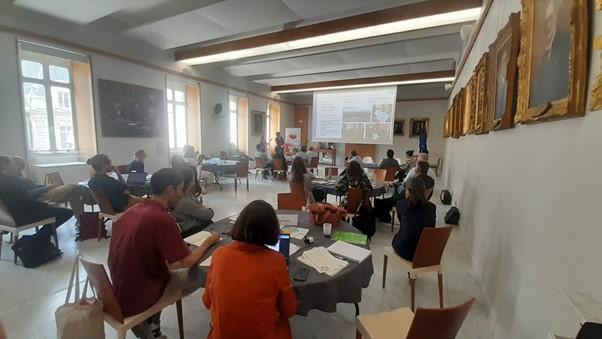Energy Cities host the Capacity Building Event in Besançon
On the 5th and 6th June, our Advisory Partner, Energy Cities invited the FEEL partnership to Besancon, France to discuss building the frugality concept into policy instruments. Energy Cities, along with the Besançon authority and ADEME (Agency for Ecological Transition), organised a very interesting and informative meeting involving key decision makers, stakeholders, project partners and local politicians. The event kicked off with a kind welcome from the Mayor of Besançon, Anne Vignot and an overview of the key objectives for the FEEL Project.
The Thematic Sessions proved successful with creative discussions on the topics all relating to the implementation of the frugal concert in our cities- meeting people to promote low tech transition, engaging a new economic model with businesses, urban regeneration and retrofitting, low tech renovation of public buildings, tackling social issues, and accelerating low tech solutions were all discussed with good practices demonstrated from project partner regions and within Besançon City.
The meeting next discussed how to create the frugal policy and implement them into local plans to support the concept. Frédéric Jan from ADEME (Agency for Ecological Transition) spoke about first understanding and classifying sufficiency to better apply the concept in a region. Frederic proposed the question does an electric car apply the frugal concept, would it be better to share a car between several families?
Julie Purdue, the Head of Ecological Transition Mission, City of Lyon presented how the frugal policy relating to waste disposal, in operation since 2009 has changed mindsets in Lyon with a reduction of tonnes of waste over ten years and an increase in items sent for recycling. Additionally, the waste collections have been reduced cutting transport costs and air pollution impacts.
Thursday morning saw the delegates exploring the frugal actions undertaken in Besançon with an inspiring tour of the city centre looking at biodiversity and urban development, the frugal refurbishment of an old army barracks and the creation of the Hop Hop Hop- a place for innovation, sharing ideas, recycling, meeting places and exhibitions.
The partners heard about the research carried out across European institutions, showing that efficiency will not be enough to limit warming to under 2 degrees. A sufficiency concept implemented is essential to reducing resource use and ensuring a future for the planet where society can thrive within planetary boundaries. The FEEL Project is working towards the implementation of the frugal concept in 8 partner cities across Europe.
